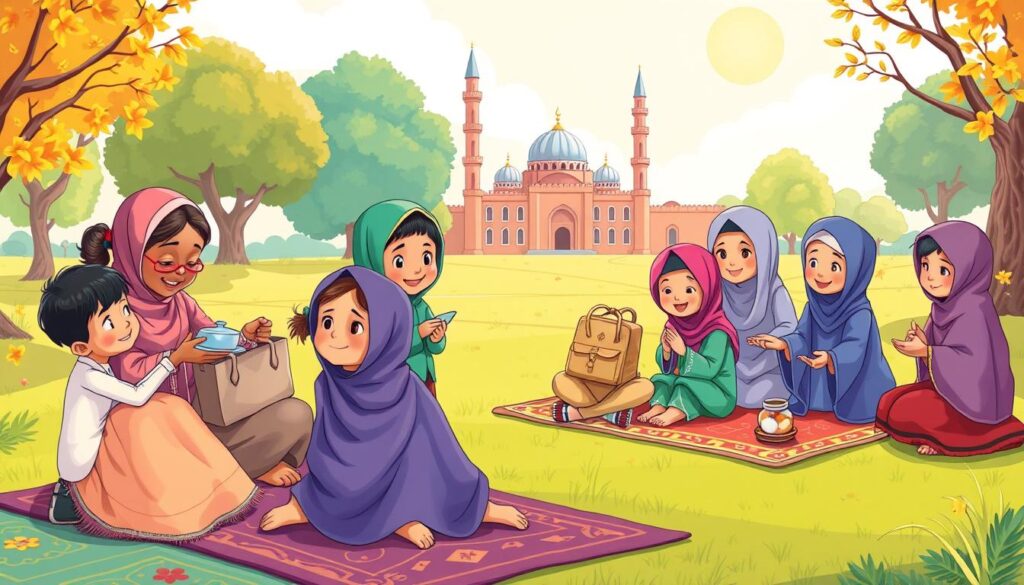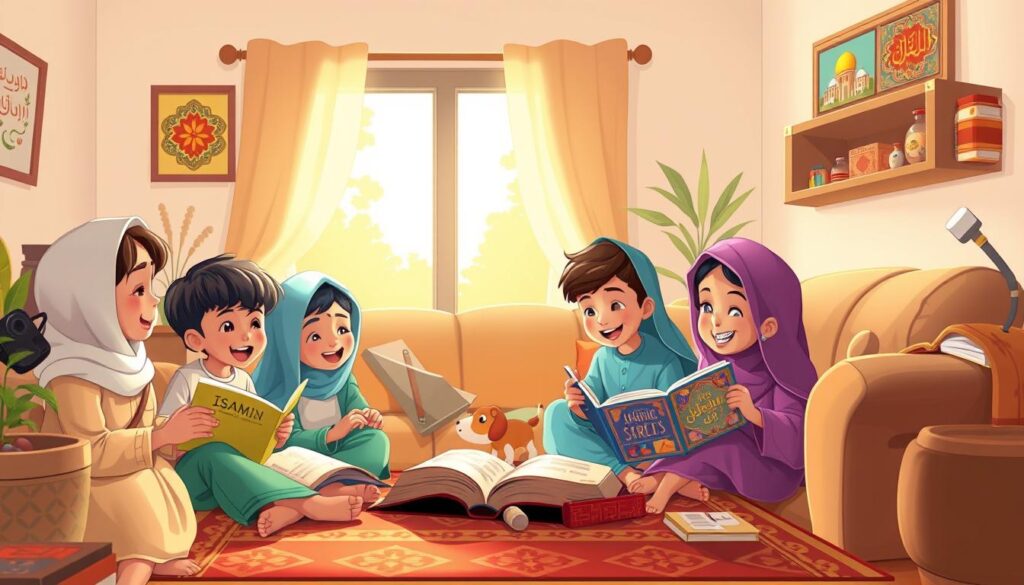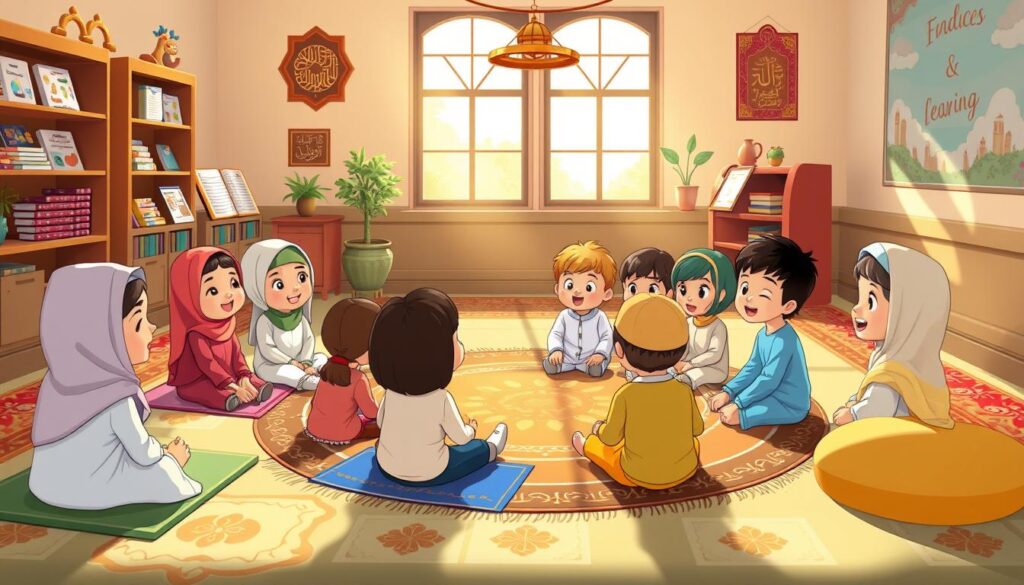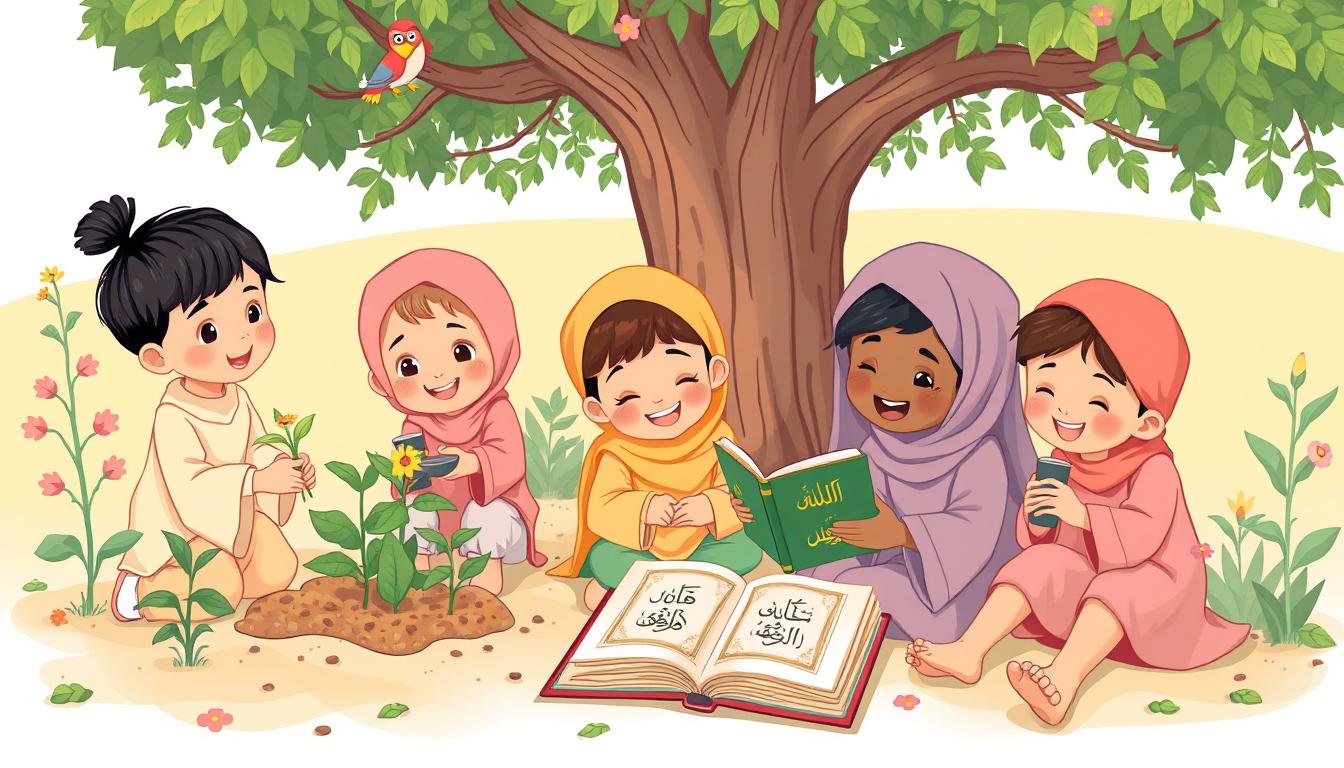100% of parents think teaching Islamic values to kids is key for their moral and spiritual growth. We want our children to learn values like honesty, kindness, and compassion. These are important for their Islamic upbringing.
We aim to give a detailed guide on teaching morals to kids, focusing on Islamic Values for Children. This will help them become good and responsible people, based on Islamic principles.
Parenting is a big job that needs effort and involvement in teaching values, like Islamic ones. We want to share our knowledge and experience. This will help parents teach their kids to follow Islam’s teachings.
Our goal is to give a practical guide on teaching Islamic Values for Children. We will talk about the role of role models, interactive learning tools, and community involvement. These are key for teaching morals to kids.
Key Takeaways
- We will provide a detailed guide on teaching Islamic values to children, focusing on Islamic Values for Children.
- Our guide will cover the importance of role models, interactive learning tools, and community involvement in teaching morals to kids.
- We will discuss the challenges of raising children in today’s world and provide tips on how to overcome them, ensuring a strong Islamic upbringing for kids.
- Our goal is to empower parents with the knowledge and skills necessary to raise righteous and responsible children grounded in Islamic principles, stressing Islamic Values for Children.
- We will share our knowledge and experience to help parents make Islamic upbringing for kids a priority, focusing on teaching morals to kids.
- Our guide will be a valuable resource for parents seeking to teach Islamic Values for Children and promote a strong Islamic upbringing for kids.
- We will provide actionable advice and strategies for parents to teach Islamic values to their children, making teaching morals to kids easier and more effective.
Understanding Islamic Values
We think it’s key to teach Islamic values to kids for their moral and spiritual growth. As we aim to raise good kids, knowing Islamic teachings is vital. The Quran talks about important values like honesty, kindness, patience, humility, and politeness. These values are central to raising kids in an Islamic way.
Islamic teachings say kindness is key for a peaceful society. The Quran, in Surah Az-Zumar, verses 33 and 34, shows honesty is a path to righteousness. To learn more about family in Islam and building a strong society, check out this resource.
What Are Islamic Values?
Islamic values come from the Quran and Sunnah. They give us over 14 key principles for guiding kids, like believing in one God and respecting parents. These values help kids find their purpose and direction in life.
Importance of Values in Childhood Development
The idea of Taqwa teaches kids to be mindful of Allah, shaping their actions. The Quran also highlights gratitude as a key trait. It shows that being thankful can lead to more rewards, showing the value of appreciation over material things. Teaching these values helps kids grow into caring, honest, and responsible people.
The Role of Parents in Instilling Values
We know how important parents are in teaching kids moral values and Islamic character. As caregivers, we shape the future leaders and community members. Islamic parenting goes beyond just physical needs. It also focuses on spiritual and emotional growth.
Creating a strong home foundation helps promote Islamic values. This lets kids develop good character. Leading by example is key, as kids learn from what they see. The Quran teaches us to teach kids about prayer, respect, and kindness.
Here are some ways to nurture Islamic character in children:
* Encourage daily prayer and Quran recitation
* Show good behavior and moral values
* Do community service and charity work
* Support a growth mindset and lifelong learning
By following these steps, we help our kids become compassionate, responsible, and spiritually strong. As parents, we have a chance to shape the next generation and positively impact our communities.
| Islamic Value | Importance |
|---|---|
| Respect for parents | Emphasized in the Quran and Hadith as a fundamental aspect of Islamic character |
| Kindness towards others | Encouraged in Islamic teachings as a means of promoting social harmony and compassion |
| Honesty and integrity | Considered essential virtues in Islam, essential for building trust and strong relationships |
Key Islamic Values for Children
We think it’s very important to teach Islamic values to kids. These values help them grow spiritually and develop good character. Teaching them to be kind, honest, and respectful is key. It helps them understand the importance of community and helping others.
Some important values to teach include:
- Kindness and compassion towards all living beings
- Honesty and integrity in all interactions
- Respect for others, regardless of their background or beliefs
- Responsibility and accountability for one’s actions
We can learn from the Prophet Muhammad’s (PBUH) teachings. He said honesty is a path to righteousness and righteousness leads to Paradise. We should also encourage kids to help others, which is a big part of Islamic values.
Teaching these values helps kids build a strong moral base. As parents and caregivers, we must guide them through life’s ups and downs. Together, we can raise kids who are kind, honest, and responsible, living by Islamic values.
Learn moreabout how to instill Islamic values in children and promote a positive, value-based upbringing.
Practical Ways to Teach Islamic Values
Teaching Islamic values to kids needs a fun and hands-on method. We aim to help children grow in a playful, interactive setting. It’s key to teach them moral values through Islamic teachings.
Storytelling is a great way to teach these values. Sharing stories of the Prophet and the Sahabah can inspire kids. For instance, Ali Ibn Abi Talib’s story at age 10 can spark their interest in learning more.
Storytelling: Sharing Prophetic Tales
Storytelling is a powerful tool for teaching Islamic values. It helps kids remember and apply lessons. We can use books and apps to make it fun and engaging.
Engaging in Community Service
Doing community service is another effective way. It teaches kids about compassion and responsibility. Activities like cleaning parks or helping at food banks are great ways to practice these values.

By using these methods, we can help kids develop good character. We should make learning fun and interactive. This way, they’ll grow into caring and responsible individuals.
Creating a Positive Learning Environment
We think it’s key to make a positive learning space for kids. This helps them learn moral values and grow in their Islamic character. A home filled with Islamic values can deeply shape a child’s growth, influencing their personality and character.
The Importance of a Value-Based Home
A home built on values gives kids a solid base to learn and grow. It helps them find their identity and purpose. By living Islamic values daily, we create a space for moral and spiritual growth. This makes our kids kind, responsible, and confident.
Encouraging Open Discussions About Values
To spark talks on values, we should listen well, ask big questions, and think deeply. This helps kids grasp Islamic values and see their importance in life. Here are some ways to start these conversations:
- Listen actively to understand our kids’ thoughts and feelings
- Ask open-ended questions to spark deep thinking and talks
- Encourage critical thinking by letting kids reflect on their actions and choices
Utilizing Educational Resources
We know how vital it is to give kids top-notch educational resources. These resources should focus on Islamic values and teachings. This way, parents and caregivers can help kids build a solid base in Islamic teachings. It’s key for growing their Islamic character and learning about moral values.
Recommended resources include books, apps, and websites with interactive content. For instance, Islamic parenting resources offer great advice for parents. Tools like My Salah Mat make learning fun and hands-on, helping kids grasp Islamic teachings better.
Here are some tips for using educational resources well:
- Begin with simple, engaging content like stories and games to grab kids’ attention.
- Use a mix of books, apps, and websites for a well-rounded learning experience.
- Encourage kids to ask questions and dive deeper into topics, fostering curiosity and critical thinking.
By using these resources, we can help kids understand Islamic values and principles. This will guide them to become kind and responsible people.
| Resource Type | Description |
|---|---|
| Books | Stories and lessons that teach Islamic values and principles |
| Apps | Interactive games and activities that promote learning and engagement |
| Websites | Online resources and tools that provide access to Islamic teachings and educational content |
The Influence of Friends and Community
Friends and community play a big role in a child’s moral and spiritual growth. When we aim for an Islamic upbringing for kids, it’s key to support good friendships and community activities. This helps our kids build a strong sense of who they are and what they believe in.
Encouraging Healthy Friendships
- Encourage kids to join Islamic community programs, like youth groups or volunteer work, to make friends who share their values.
- Help them find friends who value respect, kindness, and compassion. This creates a supportive and welcoming space for everyone.
Engaging with Islamic Community Programs
Being part of Islamic community programs, like Islamic schools like Sahlah Academy, can deepen a child’s understanding of Islam. It also gives them a sense of belonging. By instilling Islamic values in children and giving them chances to connect with their community, we help them grow into righteous children. They become confident in their faith and values.
Addressing Challenges in Teaching Values
Teaching Islamic values to kids can be tough, thanks to today’s diverse world. As Muslim parents, we aim to give our children a solid base in Islamic parenting. We guide them on moral values and help them grow with Islamic character. But, we face hurdles like secular education and modern society’s influence.
Recent stats show 77% of Muslim parents struggle to teach Islamic values today. To tackle these issues, we can use everyday life as lessons. We stress the value of daily prayers, Quran recitation, and talking openly. By setting a good example and building a community, we help our kids develop a strong Islamic identity and moral compass.
Some ways to tackle these challenges include:
- Engaging in family prayers and Quran reading to strengthen our children’s connections with Islamic practices
- Encouraging open communication and critical thinking skills to facilitate thoughtful discussions
- Seeking support from Muslim communities and organizations, such as the Islamic Society of North America (ISNA) and the Council on American–Islamic Relations (CAIR)

By working together and creating a supportive environment, we can raise compassionate, ethical, and responsible kids. They will be guided by Islamic values and principles.
Celebrating Islamic Values Through Rituals and Events
We think it’s key to celebrate Islamic values through rituals and events. This helps kids grow in their Islamic character and learn about moral values. By joining in these celebrations, kids get to understand Islamic teachings better and see their importance in daily life.
Islamic celebrations focus a lot on community and family. During Eids and other festivals, families gather to eat together, give gifts, and help others. This builds a sense of belonging and teaches kids about social responsibility, which is vital for their growth.
Importance of Prayer and Reflection
Prayer and reflection are big parts of Islamic rituals and events. By getting kids involved, we help them connect more with their faith. It also helps them find peace and calm within.
Celebrating Eid and Other Festivals
Celebrating Eid and other festivals is a great way to teach kids about Islamic values and traditions. These events give kids a chance to learn about Islamic teachings and feel proud of their faith.
To make these celebrations fun and meaningful for kids, consider the following:
* Encourage them to help others and do community service
* Teach them about the history and importance of Islamic festivals
* Get them involved in traditional Islamic activities like prayer and reflection
* Support their curiosity and encourage them to learn more about their faith
By celebrating Islamic values, we help kids grow in their faith and identity. We guide them to become kind and responsible people.
The Role of Umar Khan Charity Organization
We are dedicated to changing lives through faith-based work. The Umar Khan Charity Organization is in Mirembe Cell, Northern City Division, Mbale, Uganda. We focus on Islamic upbringing for kids and instilling Islamic values in children. Our goal is to raise righteous children who will positively impact their communities.
Our work has a big impact in Uganda. We offer education, resources, and health care to vulnerable kids, orphans, and women. By raising righteous children, we’re investing in our communities’ future. We’re promoting a culture of compassion and kindness.
Impact on Local Communities in Uganda
- Providing education and resources to vulnerable children and orphans
- Offering health treatments and support to women and children in need
- Promoting Islamic values in children and supporting their spiritual growth
How to Get Involved and Support Our Mission
We invite you to join our mission to transform lives and promote Islamic upbringing for kids. You can volunteer, donate, or help spread the word about our organization. Together, we can make a difference and raise righteous children who will lead tomorrow.

Conclusion: The Impact of Islamic Values on Future Generations
Teaching Islamic values to children is key for a kind and fair society. By nurturing Islamic character in children and guiding them on moral values, we help them grow into caring and responsible people.
Islamic education blends faith with life skills, tackling big issues and making a difference. It prepares students for success in both life and faith. Studies show that Islamic education helps build strong moral character and social duty.
We should keep promoting lifelong learning of values in a supportive and enriching space. Activities like reading Islamic books and joining community events help kids stay connected to their faith. This way, they grow morally and spiritually.
Let’s work together to create a world where Islamic teachings for kids spark a love for kindness, truth, and fairness. By raising ethical leaders, we ensure a brighter future for all.






